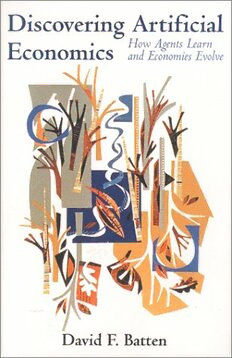
Discovering Artificial Economics: How Agents Learn and Economies Evolve PDF
168 Pages·2000·16.779 MB·English
Most books are stored in the elastic cloud where traffic is expensive. For this reason, we have a limit on daily download.
Preview Discovering Artificial Economics: How Agents Learn and Economies Evolve
Description:
Discovering Artificial Economics is an informal introduction to the ideas of modern systems theory and self-organization as they apply to problems in the economic realm. David Batten interleaves anecdotes and stories with technical discussions, in order to provide the general reader with a good feel for how economies function and change. Using a wealth of examples from evolutionary game theory, to stock markets, to urban and traffic planning, Batten shows how economic agents interact to produce the behavior we have come to recognize as economic life. Despite the book's easy-to-read style, Batten's message is quite profound. Strongly interactive groups of agents can produce unexpected collective behavior, emergent features which are lawful in their own right. These patterns of emergent behavior are the hallmark of a complex, self-organizing economy.Batten discards many traditional axioms of economic behavior. Far from displaying perfectly deductive rationality to achieve a predictable economic equilibrium, his agents face an economy that is open and dynamic. There we find evolution, heterogeneity and instabilities; stochastic and deterministic phenomena; unexpected regularities as well as equally unexpected, large-scale fluctuations. Interacting agents are forced to be intuitive and adaptive, because they must respond to a continuously changing economic landscape. Because complexity theory attempts to study a large number of agents, and their changing interaction patterns, it often gets too difficult for a mathematical solution. Thus, many of the anecdotes and results discussed in the book have emerged from agent-based computer simulations. The message is that the social sciencesare poised on the verge of a new scientific era, one in which economists will conduct experiments inside their own computers. Welcome to the new age of Artificial Economics.
See more
The list of books you might like
Most books are stored in the elastic cloud where traffic is expensive. For this reason, we have a limit on daily download.
